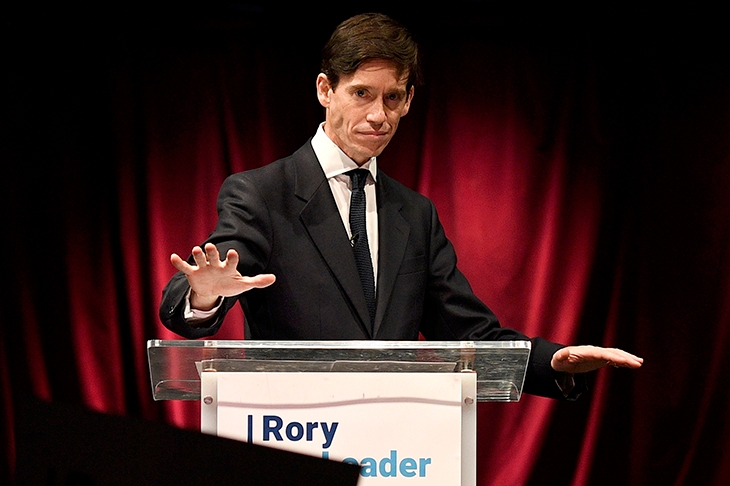You would think it would be unarguable that ‘Serious times demand a serious leader’. This, with small verbal variations, is the slogan of both Michael Gove and Jeremy Hunt in the current Tory contest, so it is obvious against whom their phrase is directed. Yet there is a counter-argument. The times we live in are undoubtedly serious, and for the past three years we have had, in Mrs May, the most unrelentingly serious leader ever. It has been a disaster. The post-2008 revolts across the western world have all been against seriousness as defined by existing leaderships. Trump, Salvini, Farage, Boris etc. strike a chord because they can burlesque the pomposity and self-righteousness of the conventional politicians who have led us badly. Words like ‘serious’ and ‘grown-up’ are used mostly by politicians and commentators who regard themselves as such, yet prove by their actions and words that they are silly. It is not serious — in the good sense of the term — for any politician who believes in democracy to try to frustrate the result of the 2016 EU referendum. Nor is it serious for any leader who claims to be a negotiator to rule out a no-deal option for Brexit. Nor is it serious for anyone who believes in the principle of consent which underlines the Good Friday Agreement to advocate a permanent Northern Irish backstop and thus a change to the constitutional status of Northern Ireland without consent. Anyone who stayed in Mrs May’s cabinet right through her repeated efforts to foist her Brexit deal on parliament was not serious about how the country should be led, except in the sense of being seriously wrong.
Is one allowed to refuse to take sides about politicians who once took cocaine? The antis sound appallingly censorious of youthful error. The pros sound like smug special pleaders for the over-privileged. Surely drug taking is just one of many questions in the overall test of character which we set our leaders? You do not pass the test by having committed no sins but by dealing with them afterwards in the right way. Impossible to define what the right way is, but not impossible to know it when you see it.
Although people over 75 will naturally be annoyed to have to pay their television licence fee once more — unless they are poor enough to qualify for pension credit — the decision will, in fact, empower them. Gordon Brown should never have let them off payment in the first place since they are the greatest users of television and radio in the country and are mostly not the poorest either. So long as they were getting the services free, they had no power over their content. They have had to endure ever more abasement before the young, propaganda for women’s football, preaching about Greta Thunberg, and the removal of people of their age from the screen. Now that they will have to pay £154.50 a year, they will carefully consider whether it is worth it, and therefore become a pressure group which the BBC cannot so easily scorn. There will be two other effects. The first will be that large numbers of tottering elderly persons will be hauled before the magistrate for non-payment, exciting public rage against the Corporation. The second will be a great technological advance among the white-haired as they learn from their grandchildren how to watch all sorts of interesting things through all sorts of interesting media without having to pay anything at all to the BBC.
Assuming, that is, that grandchildren will still be permitted. On Thought for the Day on Tuesday, ‘John Bell of the Iona Community’ (whom I have long suspected of being the creation of a satirist) told listeners about an Anglican conference in the South Seas which he had recently organised. He made children sit with adults and tell them how they saw the future in the light of the climate ‘emergency’ now being touted as fact. One girl from Fiji said that she felt she should not marry and have children because of the harm they might do to the planet. Instead of trying to reassure the poor child out of her life-denying terrors, Bell praised her ‘spirit of sacrifice’. When the planet and the human race survive when we fail, as we certainly will, to hit the global carbon targets by 2050 which the government has just announced it will legislate for, we shall wonder how we ever inflicted such a misanthropic philosophy upon ourselves.
The Basic Law which governs Hong Kong under the agreement resulting from the Sino-British Joint Declaration of 1984 applies for 50 years from the handover of Hong Kong to China in 1997. So we are less than half-way through the period covered, yet already China is making a monkey of the agreed principles and Britain’s protest is inaudible. The latest and most serious infraction is the attempt to impose a law permitting extradition from Hong Kong to China for all sorts of alleged offences displeasing to Beijing. This would violate the underlying principle of ‘one country, two systems’ agreed by Mrs Thatcher and Deng Xiaoping. That word ‘two’ has always made China unhappy. The word it likes best is ‘one’. When it first launched its formal plan for world domination via trade in 2013, it called it ‘One Belt One Road’, though it later toned this down to ‘The Belt and Road Initiative’. The sad fact is that the Tiananmen Square massacres of 30 years ago, while causing great embarrassment to China at the time, did work. China has proved that tyranny and economic success can go together. The world tacitly gave it permission to operate on that basis. Is it already too late to avoid the consequences, not only in Hong Kong, but in Africa, Asia and even Europe?







Comments